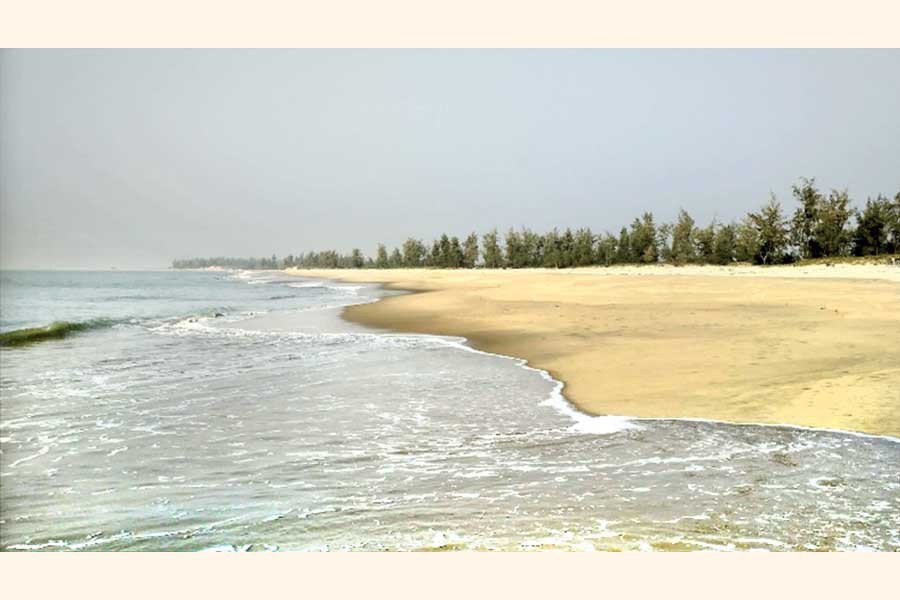
Published :
Updated :

Sonadia Island, a nine-square kilometre small island in the Bay of Bengal, is likely to lose its 'virginity' as the authorities concerned are building an eco-tourism park there, according to local people and environmentalists.
An island is called virgin when the landscape of the island remains natural.
Urbanisation like lighting, high-rise buildings and high density of population costs an island its virginity, according to people who work on biodiversity.
The island -- the smallest local government unit under Moheshkhali of Cox's Bazar district -- is an ideal place for some endangered species, animals and birds.
They are olive ridley sea turtle, spoon-billed sandpiper and red-crabs.
Besides, many species of birds migrate here during winter season.
In 1999, the government declared it an "ecologically critical area (ECA)" to protect wildlife and promote biodiversity.
The ECA is an environmentally protected zone where the ecosystem is considered to reach a critical condition by the changes brought through various human activities.
But the Bangladesh Economic Zones Authority (BEZA) has acquired it by paying a token amount of Tk 1,001 to build an eco-tourism park, according to Upazila Nirbahi Officer (UNO) of Moheskhali Jamirul Islam.
Currently, the BEZA has restricted movement of people on the island as it is likely to begin the implementation phase of the park, the BEZA people concerned have said.
They also said Indian business behemoth Mahindra Group is expected to build the park at a cost of Tk 1.5 billion.
According to the BEZA plan, about ten luxury hotels, two golf courses, and two tennis courts will be built there to attract tourists. It will also build some recreational units.
The economic zone-promoting organisation will, however, keep some lands green as part of conservancy.
When contacted, BEZA Executive Chairman Paban Chowdhury told this correspondent that Sonadia Eco-Tourism Park would turn into a new tourism city like Cox's Bazar city. "We have already created a master plan and completed the initial survey," the BEZA chief said.
He said that the BEZA would create many facilities on the island and assign security forces to prevent further land encroachment.
Mr Chowdhury said that in order to keep the island eco-friendly, only 25 per cent of the land would be used for the planned park without affecting the environment.
On the other hand, environmentalists say that this will be another Saint Martin's Island after the construction of the planned park.
They said nature will take revenge if people do not take proper care of it.
Each species -- no matter how small -- has an important role to play for the betterment of the earth.
Syeda Rizwana Hasan, a Bangladeshi attorney and environmentalist, has told this correspondent that there is no example of conserving an area by building an eco-park.
Ms Hasan, also chief executive of Bangladesh Environmental Lawyers Association (BELA), said that huge development work on the virgin island would seriously impact its ecological structure.
She said that arrival of tourists and construction of high -- rise buildings are believed to be having a bad impact on the environmentally -- critical island.
"Eco-tourism brings bad impact for the ECA area," Rizwana said.
Ibrahim Khalil Mamun, chief executive of Youth Environment Society (YES), said that Sonadia Island would lose its attraction to many tourists who prefer natural environment.
"The turtles, crabs and rare species of birds attract many to the island," Mr Mamun said.
Enam Ul Haque, president of Bangladesh Bird Club, said that spoonbill birds are rare in the world. "Now there are around 25 such birds on the island," he said.
When contacted, Moheshkali Upazila UNO Jamirul Islam told the FE that BEZA had acquired the entire island for development work last year. "Development work is now going on in the island," the UNO said.
Kajol Akter, the lone union council member at the island, told this correspondent that the natural beauty would no more exist after implementation of the eco-tourism park. "We fought to conserve it but all attempts went in vain," she said.
Currently, the island has some makeshift structures of around 2,500 people, mostly belonging to fisherpeople, according to the country's population census of 2011.
clicox121@gmail.com


 For all latest news, follow The Financial Express Google News channel.
For all latest news, follow The Financial Express Google News channel.